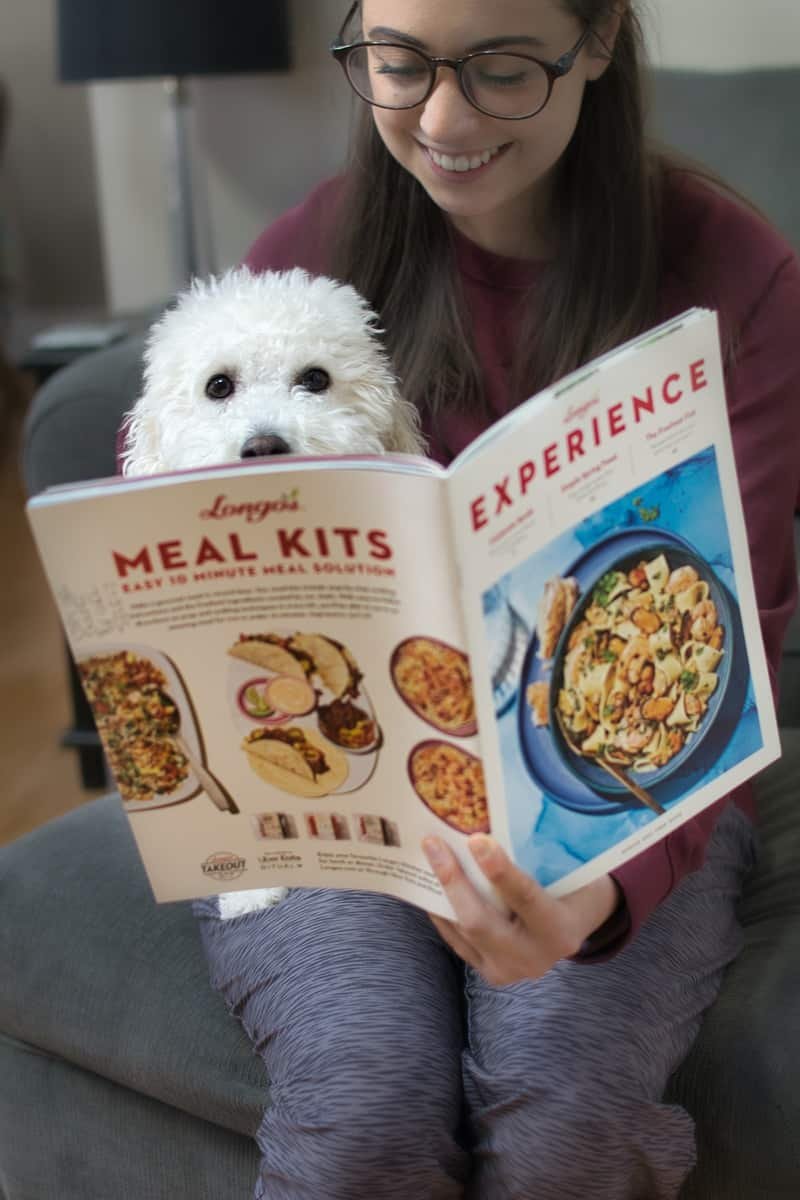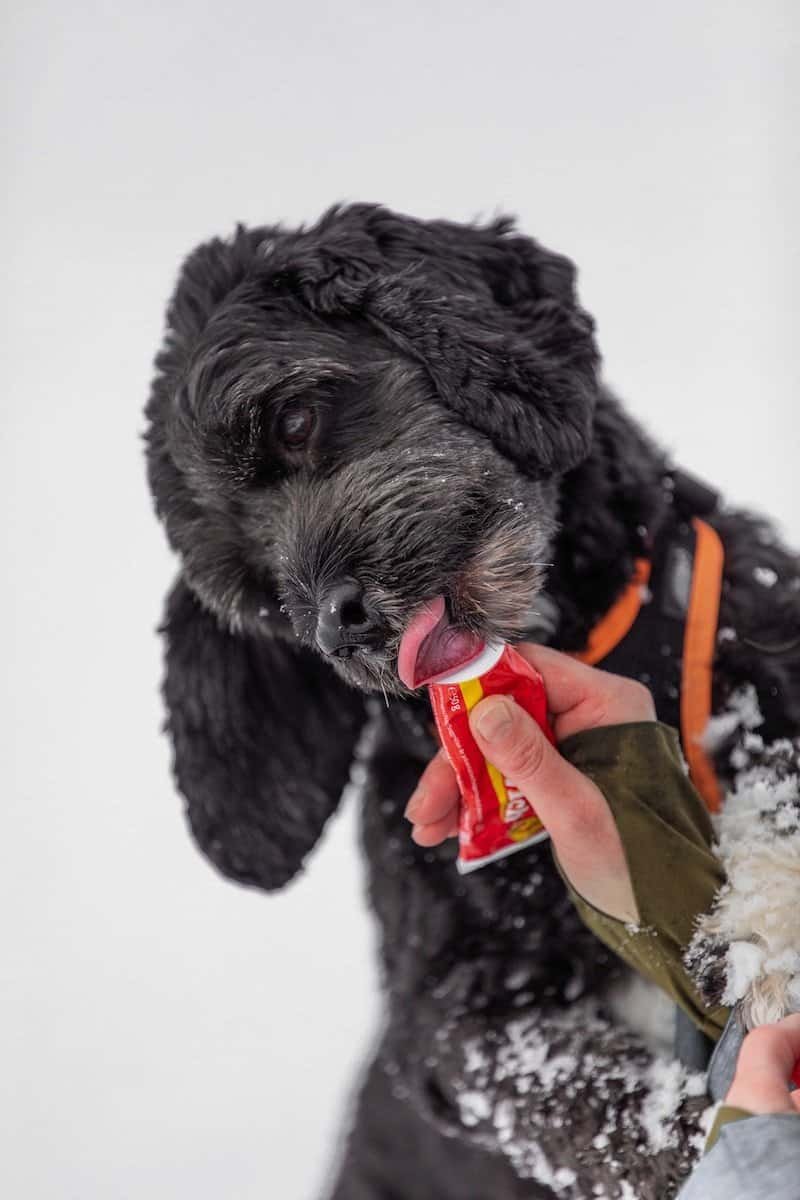
The entire world recognizes the Poodle as one of the most intelligent dogs with a high activity level. Poodles love to learn and play, especially if it means spending a lot of time with their pet parents.
If you own a Poodle, regardless of variety, you’ll want to make sure he lives his life to the fullest. For that to happen, you shouldn’t only groom and exercise your dog daily; you must also meet your Poodle’s nutritional requirements!
Read on to learn about the proper nutrition of Poodles and what to feed them.
From Our Experience: As poodle enthusiasts who have worked with hundreds of poodle owners and rescue organizations over the years, we’ve gathered real-world insights that go beyond textbook knowledge. The information in this article reflects both professional expertise and hands-on experience with poodles of all sizes and temperaments.
How Often to Feed Poodles
You can base the frequency of your Poodle’s meals based on his age.
If your Poodle is under three months of age, you could try free-feeding before placing him on a feeding schedule. Leave food out at all times, but make sure its fresh food and that you aren’t merely topping food off throughout the day. Rinse and clean your puppy’s bowl when necessary to avoid contamination from the old food.
If your Poodle is 3-12 months old, then you can begin a feeding schedule of three meals per day with snacks.
If your Poodle is now an adult over 12-18 months old, that doesn’t mean you should give him one meal a day. Smaller Poodle varieties like the Miniature Poodle and Toy Poodle will benefit more with 2-3 meals per day. Standard Poodles are okay with single dinnertime feeding, though it’s best to split their food into two meals daily plus snacks.
How Much Should You Feed Your Poodle?
There are different factors regarding the food you should give your Poodle daily. These factors will also determine the type of nutrition your Poodle requires.
Consider the following factors:
How active is your Poodle? Dogs with higher activity levels will require lots of protein, carbs, and fats than more sedentary dogs. Like an athlete who needs more calories, the active poodle will have a higher calorie requirement to build muscle mass and maintain energy.
Does your dog have food allergies? Dogs with allergies are more susceptible to low-quality ingredients that can affect their sensitive stomachs.
What’s your dog’s age and weight? Dogs will have varying nutritional and caloric requirements based on their lives and total weight. If you have an underweight dog, you will need to add more food to reach a healthy weight with balanced nutrition.
Puppies require more calories per pound compared to adult Poodles. Puppies need 40-55 calories per pound of body weight, while adults need about 35-45 calories per pound of body weight. Senior Poodles with reduced mobility and slower metabolisms require about 40 calories per pound of body weight.
As for protein, a Poodle will require two grams of protein for each pound they weigh. Look for food with an excellent protein source to help your dog build lean muscle.
Note that those numbers can vary, increasing or decreasing by 20%.
If you feed your Poodle commercial dry kibble, then you can follow the manufacturer’s suggested feeding guidelines. The guidelines are accurate as they base measurements based on a Poodle’s age and weight. Because of that, you shouldn’t merely estimate your Poodle’s weight but know what it is within 1-2 pounds.
For those feeding their Poodles a raw diet, the (loose) rule of thumb is to feed your dog about one ounce of food for every 1 pound of body weight daily. The amount varies depending on the ingredients you add, so use the rule as a starting point.
To get a more accurate answer, talk with a board-certified veterinary nutritionist. He can share what key nutrients your Poodle needs and how much of it to feed your dog daily.
Wet Food versus Dry Food
If Poodles had their way, they would most likely enjoy eating wet food more. Experiment. Try dry food over wet, as it’s better for your Poodle’s gums and teeth. Bite-sized kibble is easier on your dog’s stomach and intestines, while wet food may cause runny stools.
Grain versus Grain-Free Food
Until recently, there has been little debate on grain and grain-free dog food. The vet will switch it into a grain-free recipe if your dog has food allergies or gastrointestinal issues when eating regular dog food with grains.
However, that all changed when experts discovered that several dogs that were unsusceptible of dilated cardiomyopathy developed that heart disease. You guessed it; those dogs were on a grain-free adult diet.
Many pet owners immediately presumed that it was time to switch back to a well-balanced diet with grains. However, we require more studies on the matter, as a recent update from Tufts University’s Veterinary Medical Center suggests that the grain-free diet alone isn’t the primary issue.
But for now, experts theorize that a specific diet may be the one to blame. The BEG diet stands for Boutique (small local brands) with exotic, non-traditional meats (alligator, bison, kangaroo, ostrich, venison, etc.) and grain-free, with sweet potatoes, peas, and legumes as one of the significant ingredients.
That said, there aren’t any recalls of grain-free dog food brands. The FDA is still looking into other possible links to dilated cardiomyopathy in dogs on a grain-free diet, including the BEG diet theory.
That said, if your Poodle doesn’t respond to a commercial diet with grains, you can opt for a brand containing traditional meats such as beef, chicken, fish, or turkey. If you’re unsure about the grains your Poodle is okay with, then look into feeding him non-gluten and non-wheat grains such as quinoa, oatmeal, and white or brown rice. These can lessen the risk of allergic reactions or health issues in the long run.
How to Choose the Best Poodle Dog Food
When choosing high-quality dog food brands, here’s what to look for:
100% all-natural dog food with no artificial additives. It should have a natural flavor that focuses on meeting your dog’s dietary requirements.
Dog food with natural preservatives. Yes, you can find healthier ways to preserve dog food, such as using vitamin blends. Usually, these are mixed tocopherols, or food manufacturers use certain herbs like rosemary or mint.
Wholesome food ingredients. Choose between animal sources like real chicken, duck, lamb, turkey, rabbit, beef, and various fish types for a meat and protein source. It’s also vital for your Poodle to consume certain fruits and vegetables for their natural antioxidants, vitamins, and minerals.
There shouldn’t be any fillers in dog food. All the ingredients should ensure optimum health with a balance of nutrients, lots of protein, and a blend of antioxidants.
Poodles require a proper balance of healthy grains or non-wheat and non-gluten ingredients.
Dogs need appropriately added extras, such as chondroitin and glucosamine for joint health, omega-3 fatty acids for skin and coat health, and probiotics for digestion.
Besides that, you should also know what to avoid in a complete diet:
Artificial flavors, such as MSG and artificial coloring. Avoid coloring like Blue #2, Red #40, or Yellow #5 and #6, which are associated with severe health issues such as behavioral and neurological issues like hyperactivity and insomnia. These artificial colorings link to health conditions like certain cancers.
Chemical preservatives, though it’s tricky to avoid as some commercial food for Poodles don’t label them. If chemical preservatives are part of the adult food in lower levels to protect protein meals, you won’t find them in the food ingredients list.
Animal by-products are animal parts that are unfit for human consumption, such as the genitals, lungs, spinal tissue, spleen, beaks, intestines, and hooves. These are not excellent sources of protein.
Generic oils or meats pertain to animal species, with food manufacturers using 4D animal parts. The animal sources they use come from disabled, diseased, dying, or dead farm animals, zoo animals, and at times, roadkill! Avoid those animal products at all costs.
Puppy formula or adult dog food with a high grain count. While it’s good to include wholesome grains, high wheat and gluten levels can cause allergies or poor digestive health.
There must be no feeding of fillers, which you can commonly find in cheap dog food brands. Fillers are inexpensive ingredients that manufacturers add simply to plump food but have no nutritional value. Fillers include soy, wheat middling oat husks, peanut hulls, cereal grains. Ingesting these fillers contributes to eating feces. It’s linked to malnutrition as your poodle gets fewer nutrients from his food.
Homemade Meals for Poodles
Not a fan of commercial dog food or puppy food? You can also prepare homemade meals so you have more assurance that your pet gets all the nutrients with no artificial flavoring or preservatives.
Here are tips on feeding your Poodle a raw food diet to ensure he gets a balance of proteins and essential nutrients:
Use natural ingredients with a mix of high-quality protein, fruits, vegetables, and healthy grains.
The source of protein can come from need, chicken, lamb meal, turkey, veal, and fish like salmon, whitefish meal, cod, or flounder.
Include vegetables like lima beans, green beans, carrots, zucchini, potatoes, and sugar snap peas.
Add in blueberries, apples, pears, strawberries, and raspberries.
You can also add extras to increase caloric intake, protein content, or omega fatty acids. Add eggs, extra virgin olive oil, salmon oil, plain whole white yogurt, or cheeses containing low lactose levels like Swiss cheese, cottage cheese, Colby, or Monterey Jack.
When cooking your dog’s balanced meal, explore with daily supplements meant for dogs to support canine nutrition.
On Feeding Your Poodle Snacks
Snacks and treats are another essential part of a Poodle’s diet. These treats may account for only up to 20% of what your dog needs to consume daily.
Opt for baked or crunchy dry treats to keep your Poodle satiated between meals. For rewarding your dog during training, give it moist and chewy treats as it eliminates behavioral issues.
Please do not feed your Poodle too many treats, as this can have your dog go over his daily calorie requirement. Doing so can lead to unnecessary weight gain and even obesity.
Also, do not feed human food as a treat or a small snack. Sure, it’s hard to resist those begging eyes, but human food is bad for your dog, especially with a high-fat content!
Feeding a New Poodle
Before bringing your new Poodle home, it’s crucial to discuss the commercial food brand with the breeder or shelter they feed their dogs. If you feed your new dog a whole different type of food right away, he may experience digestive issues and an upset stomach.
Breeders and shelters have to feed many dogs, that would factor into their chosen brand. You’ll want to test dry kibble or wet food for your new dog, to see learn what they like, any mood or energy differences. Make the change gradual and try to figure out if they have a preference or if they are just going to eat whatever is in front of them.
Get both current and new food on hand, making a gradual switch over the next three weeks. Here’s one way you can introduce a new brand of pet food:
1st week: Feed 3/4 of the old food and 1/4 of the new food
2nd week: Feed 1/2 of the old and new food
3rd week: Feed 1/4 of the old food and 3/4 of the new food
4th week: You can completely switch to the new food




